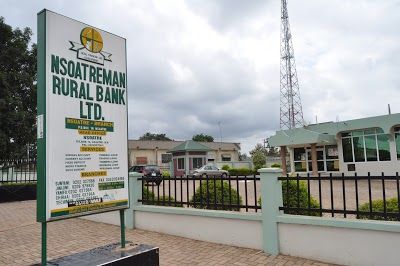By Edward Adjei FRIMPONG
Business loans and targeted credit schemes are essential tools for unlocking potential in underserved communities. With the right financial support, small enterprises can expand operations, invest in new technology, create jobs, and build resilience against unexpected costs.
For individuals, access to credit can be the key to transitioning from informal to formal business activity, improving livelihoods and long-term financial stability.
This is where rural and community banks (RCBs) play a critical role. By designing credit schemes tailored to the realities of local entrepreneurs and farmers, rural banks help bridge the financing gap. Their proximity to the community, understanding of local needs, and flexibility in lending make them uniquely positioned to drive inclusive economic growth.
In July 1976, the first rural bank was established at Agona Nyakrom, a farming community in Ghana’s Central Region. The rural banking model was conceptualized at a time when access to bank credit for rural folk, including farmers and small-scale traders, was elusive.
Over the years, the rural banking sector has expanded in terms of asset quality, capital adequacy, liquidity, profitability, and visibility. As of December 31, 2024, there were 147 RCBs in Ghana, with a total asset base of GH¢11 billion.
One such financial institution is Nsoatreman Rural Bank, headquartered at Nsoatre in the Sunyani West Municipality of the Bono Region. Incorporated in 1984, the bank has steadily expanded its presence, opening branches in Techiman, Sunyani, Yamfo, Jinijini, and Chiraa.
Through strategic credit schemes, the bank is revitalizing micro and small enterprises once struggling to survive. Today, many of these businesses—from roadside vendors and traders to agro-processors—are expanding operations and creating jobs, all thanks to timely and innovative financial support from Nsoatreman Rural Bank. The positive ripple effect is visible across communities, reinforcing the bank’s role as a key driver of grassroots economic development.
In place of traditional collateral, the bank has introduced innovative lending approaches such as cash flow-based financing and group-guaranteed loan schemes. These models allow the bank to offer loans of up to GH¢100,000 to qualified enterprises. As of December 31, 2023, the bank’s total loans and advances stood at GH¢16.75 million. Additionally, Nsoatreman Rural Bank offers flexible repayment options—including fortnightly, weekly, and monthly plans—customised to suit business operations and even the gestation periods of crops under its agricultural financing portfolio.
In an interview, the Chief Executive Officer of Nsoatreman Rural Bank, Mrs. Agnes Grimmon Intsiful, stated that the bank considers business turnover, viability, profitability, and the experience of operators before advancing loans—often without requiring collateral.
“In the case of group loans, we recognise that many individuals within our catchment area are low-income earners who may not be able to provide traditional collateral. This is why we implement a group-guaranteed lending model, including for agribusiness financing,” she explained.
Mrs. Intsiful added that the bank places a strong emphasis on post-disbursement monitoring to prevent avoidable defaults and ensure loan sustainability.
A 37-year-old trader at the Fiapre market near Sunyani, Perfect Ametorwodo, has been in business for ten years. She started a mini grocery shop with start-up capital from her husband. Gradually, she saved with Nsoatreman Rural Bank under its microfinance scheme. Three years ago, she desired expansion and subsequently took a loan under the group-guaranteed loan scheme to open another shop at the Fiapre market.
“What makes the facility from Nsoatreman unique, compared to other financial institutions, is that it is cash flow-based and requires no collateral. Its flexible monthly repayment schedule has helped me avoid default,” she said.
Nsoatreman’s financial support has placed Mrs. Ametorwodo’s business on a strong growth trajectory. She currently employs two female shop attendants. As of April 2025, she was nearing completion of her loan repayment. Her next goal is to secure a larger facility from the bank to further expand her operations.
“I intend to open a warehouse, travel to neighbouring countries to purchase stock, and start wholesale supply across Fiapre, Sunyani, and beyond,” she added.
Morris Mohammed Moro, a 38-year-old electrical appliance dealer at the Sunyani market, is reaping the benefits of a business transformation made possible by a loan facility from Nsoatreman Rural Bank.
Mr. Moro transitioned from selling CDs—an enterprise that declined due to technological changes—to establishing a home appliance shop in 2014, with financial backing from the bank. Over the years, the business has grown remarkably, leading to the opening of three additional outlets in Sunyani and the employment of eight people.
Beyond retail, Mr. Moro has diversified into the commercial transport sector and acquired nine plots of land earmarked for future development.
“With support from Nsoatreman, plans are far advanced to open at least two shops each in towns such as Techiman, Goaso, Dormaa-Ahenkro, and Berekum. I’m also looking to venture into real estate development,” he said.
Conclusion
Innovative approach to grassroots financing like that of Nsoatreman Rural Bank has proven that access to credit—when tailored to local realities—can transform small businesses and uplift entire communities. By empowering local entrepreneurs, the financial institutions would not just be funding ventures but fuel inclusive economic growth across the country.










